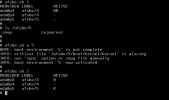I am currently running 13.1-RELEASE on my server with UFS file system and would like to install 13-stable in a free GPT partition with the idea that I could dual boot by selecting one or the other OS through the UEFI boot menu. During initially install I copied /boot/loader.efi to /EFI/BOOT/BOOTX64.efi on eps partition. I have read the efibootmgr man page but I don't quite get how to tell BOOTX64.efi to use a particular partition as root. I think I can update /etc/fstab to use the new partition and stick with same loader.efi. Another option would be setting currdev= and rootdev= in loader.conf; would appreciate clarification of listing device name "/dev/mirror/root0" vs "root0". Wonder if there is a better solution and would appreciate some guidance in this regard. Is it recommended to use grub or rEFInd to manage the boot process?
More info from efibootmgr if it helps:
More info from efibootmgr if it helps:
Code:
root@daria:/boot # efibootmgr -v
BootCurrent: 0000
Timeout : 0 seconds
BootOrder : 0004, 0001, 0003, 0000, 0002, 0005
Boot0004* FreeBSD HD(1,GPT,f5de00f2-0ca9-11ed-85fc-782bcb02e2bc,0x28,0x82000)/File(\efi\freebsd\loader.efi)
Boot0001* PLDS DVD+/-RW DS-8A5SH PcieRoot(0x0)/Pci(0x1f,0x2)/Ata(Primary,Master,0x0)
Boot0003 Windows Boot Manager HD(3,GPT,66822183-2af8-484a-ae79-f0ca805e8ea7,0xa800800,0x32000)/File(\EFI\Microsoft\Boot\bootmgfw.efi)
+Boot0000* EFI Fixed Disk Boot Device 1 PcieRoot(0x0)/Pci(0x4,0x0)/Pci(0x0,0x0)/SAS(0x5000c50026029eb5,0x0,0x1,SAS,External,Direct,0,0x0)/HD(13,GPT,5b694d58-217c-11ed-9295-782bcb02e2bc,0x3000028,0x104000)
Boot0002* EFI Fixed Disk Boot Device 2 PcieRoot(0x0)/Pci(0x4,0x0)/Pci(0x0,0x0)/SAS(0x5000c50026353ced,0x0,0x1,SAS,External,Direct,0,0x0)/HD(13,GPT,5adc7cec-217c-11ed-9295-782bcb02e2bc,0x3000028,0x104000)
Boot0005* EFI Fixed Disk Boot Device 3 PcieRoot(0x0)/Pci(0x4,0x0)/Pci(0x0,0x0)/SAS(0x5000c50026398b99,0x0,0x1,SAS,External,Direct,0,0x0)/HD(13,GPT,5aa830bc-217c-11ed-9295-782bcb02e2bc,0x3000028,0x104000)

